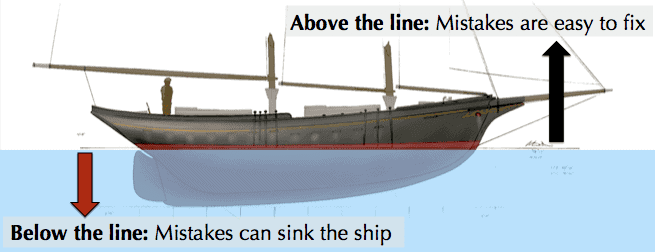If you've ever had a frustrating boss, you know how true it is: People leave managers, not companies.
… but that doesn't mean the responsibility lies entirely on your boss to make you love your job.
You play a part in managing the relationship between you and your manager. Put another way, this is what it means to manage up.
The truth is, you have more power than you might think to influence your relationship with your manager. It's true whether you are trying to turn it from bad to good, good to great, or want to keep a good thing going.
By taking responsibility and deciding to work with your manager to improve your relationship– whether it was good to begin with or not– you can overcome problems and make work much more enjoyable for both of you.
That's why learning to manage up is such a vital skill.
What does it mean to manage up?
Managing up means proactively working on the relationship between you and your manager. You need to understand their priorities, anticipate their needs, build rapport with them, and get to know how they think. All of this will then help you help them be more successful.

Why is knowing how to manage up important?
When you start a new job, you often don't know much about your manager. You often don't get to pick who they are, and learn very little in the interview process.
And even if you have a great manager, you're one re-org or project priority shift from having someone totally new, who may be just as good, or bad as the last manager. Yet, either way, you're starting over with a new, important relationship.
That's why managing up is such a valuable skill to master. It can help you overcome whatever problems exist and smooth out the relationship, improving your work experience in the process. It also can help you start on the right foot with a new manager, making it easier to build a positive relationship from day 1.
Most importantly, when your manager succeeds and enjoys working with you, you win too; if they get more budget, new opportunities, and deliver wins, you're likely to get credit, new opportunities, and wins as well.
An ounce of prevention is worth a pound of cure...
Things don't have to be bad for it to be worth working on your relationship with your manager.
Even if things are good, taking steps to meet one-on-one with your manager and learning how you can help improve the relationship can make things even better.
So whether you love your manager, are just getting to know them, or struggle with working with them, getting better at managing up is a great skill to develop. That's why today's post gives you a variety of topics and questions to discuss with them to help you be great at it.

22 Questions to Ask Your Manager to Improve Your Relationship and Better Manage Up
Leadership coach and Vistage Chair Beth Armknecht Miller says there are three things you need to improve your relationship with your manager and manage up effectively:
"Over the years, I have had the opportunity to coach many rising stars on their relationship with their manager, which is often the most critical to their success in an organization.
Here's what I tell them:
1) Know your boss's priorities and goals. When you know his/her priorities, you can tailor the information you share during meetings and conversations with them. And when you are able to assist your manager in accomplishing his/her goals, you are demonstrating you are dependable and take initiative, two highly coveted traits managers look for in their employees.
2) Anticipate the needs of your manager. The more you anticipate the needs and demonstrate your understanding of them, the more confidence and influence you will build with your manager.
3) Talk like your manager. Use the language and terms that he or she often uses and focus on the topics that are most important to him/her.”
To learn your manager's priorities, anticipate their needs, and communicate with their language requires that you get to know them. The best way to learn them quickly is through regular one-on-ones with them.
A recurring, lengthy time meeting with them one on one gives you the opportunity to listen, learn, ask questions, and share what's important to you. There's no other time like it.
If you don't already have them, work to get a regular spot on their calendar, so that you have time to build rapport and get to know them better.
You can't pick your boss, but you can take steps to improve your relationship and make work a more enjoyable and productive experience.
While ultimately we recommend you find a job and manager you love, these questions can help improve any situation and teach you to manage up effectively.
*To learn more about how to have effective one-on-one meetings with your manager, read: 7 Essential Tips for Effective 1 on 1 Meetings with Your Manager.
Questions to understand your manager's goals and priorities
Your manager has certain goals and priorities– but they won't always explicitly tell you what they are.
Unfortunately, those priorities can impact everything you do and how you do it. This means that investing some time to find out what things are most important to them before problems arise is vitally important.
While in a dream world, they'd always tell you, sometimes you have to ask.

Leadership expert and Lead from the Heart author Mark Crowley suggests doing a little detective work to find out:
"Ask your colleagues to individually share examples of things they've done to successfully meet your boss's needs in the past. You'll quickly see there are many common denominators – and these practices are the ones you'll want to consistently provide.
When you feel like you have solid footing with your boss, you can and should ask them directly: ‘What are some things I could do better or differently to help you succeed even more?'”
Here are more questions you can ask to help uncover your manager's goals and priorities to better manage up:
- 1) Here are my top X priorities. Do these align with your priorities? (Make sure you're doing the things that matter most.)
- 2) What are your priorities? What wins do you need?
- 3) What gives you confidence in the work of your team members?
Use the waterline concept to encourage trust and improve communication
Another helpful question to ask is:
- 4) I learned about the concept of a waterline...what do you consider above or below the waterline for myself or our team?

This applies the "waterline” concept, a great analogy that manufacturer W. L. Gore uses to encourage trust and improve communication, but it's also helpful for understanding their priorities:
"The waterline principle means that it's ok to make a decision that might punch a hole in the boat as long as the hole is above the waterline so that it won't potentially sink the ship.
But, if the decision might create a hole below the waterline which might cause the ship to sink, then associates are encouraged to consult with their team so that a collaborative decision can be made.”
Using the water line concept can help make both you and your manager's lives easier by establishing a defined process for when you really need to check in with them, and when you can be given more autonomy and independence.
As a follow-up, make sure to be clear with your manager about how you'll treat below and above-the-water-line tasks. For example, you might say, "I'll keep you informed at a high level, but work independently on above the water line tasks. Meanwhile, I'll be more detailed, and come to you quickly for things below the waterline if they start having problems."

Questions to understand how your manager thinks + their language
As we talked about earlier, Beth Armknecht Miller reminds us that the third thing she tells people working to improve their relationship with their managers is to, "Use the language and terms that he or she often uses and focus on the topics that are most important to him/her.”
Why is it important to use your manager's language when communicating with them?
It works for the same reason the human mind often naturally imitates another's speech when talking to someone with an accent. According to a University of Riverside study on the phenomena:
"This unintentional imitation could serve as a social glue, helping us to affiliate and empathize with each other.”
When you adopt your manager's common terms and language, you're connecting and relating to them better. This is what allows you manage up more effectively as you become closer to them.
Build strong lines of communication with your manager
Even better, the more you work to understand how they think and can communicate from the perspective of the things that matter most to them, the better you can work with them. Understanding how they think and communicating from that perspective is just another level of effective communication.
Here are more questions you can use to help you get into your manager's mind and pick up on their language:
- 5) How can I build more trust with you on the work I do? (Great if they're a micro-manager)
- 6) What is most important to you to be up to date on for progress I'm making?
- 7) Where do you trust my work and I can be more autonomous?
- 8) What causes you to feel stressed about my work? What gives you confidence?
- 9) What part of my work are you most comfortable and familiar with? What parts of my work are things you haven't done as much yourself? (This is understanding their Task Relevant Maturity)
- 10) What have your best team members you've enjoyed working with done when working with you that you liked?
- 11) What have team members that frustrated you or were challenging to work with done or failed to do?
- 12) How do you like to be updated? What is your preference for format, timing, or structure?
- 13) Can you share with me an example of an update you've gotten from a team member that you really liked? (Copy what they say works!)
Questions to help anticipate what your manager wants
To manage up successfully, you need to learn about your manager, so that you can anticipate what they'll want. The better you can do that, the more they'll trust you, and you'll strike a balance between them being hands off, and supportive when you need it.
Being able to anticipate what your manager wants can also help overcome one of the most common workplace issues: poor communication.
Many issues develop because an employee is afraid or hesitant to open up. They fear they'll be bothering their manager, so they never say anything (nor does anyone else). Over time, the issue gets worse until it's too late.
But the reality is, it's often misplaced fear. At least in the case of a good manager– as former Flexport engineering manager Jason Crawford echoed:
It's a great way to see if you have a good manager or not. A good leader runs towards problems and addresses them, a bad one hides and shoots the messenger.
— Jason Evanish (@Evanish) August 7, 2019
You see things that your manager doesn't, so bring up problems you think they should know about. A good manager will be excited to learn from you, and thank you for the information. Meanwhile, even a bad manager may welcome you bringing up a problem if you also come to them with suggestions for a solution.
This is a great question to help you do that:
- 14) I noticed problem X and was thinking Solution Y could help. What do you think of that?
Or, if you have a couple potential solutions and want their help choosing the right path forward, ask them:
- 15) I noticed problem X and was thinking Solution Y or Z could help. Which do you think is better?
After asking either of the questions, consider following up with, "How could we make that happen?” to try and nudge the solution along and make sure action is taken to actually resolve the issue. If you can also provide context on why the problem is important, this can help them understand why you prioritized bringing it up, and why you should do something about it.
Here are then a few more questions to help you understand and anticipate what your manager needs and manage up better as a result:
- 16) Would X be helpful for you? How would you change it? (Great if you have an idea to help you or the team)
- 17) What do you recommend I do when I get stuck on <area you're weaker on>? (What do they want you to do when you get stuck / need help? This is also a great way to ask for coaching versus waiting for them to coach you spontaneously.)
- 18) At what point do you want me to ask you for help versus figure it out on my own? (When do they want you to stop trying to figure it out on your own and ask for help?)
- 19) If I need help with something, what's the best way to get your input or support on something? (Useful if they have a hands-off management style and for finding out how they want you to go about getting input/support from them)
- 20) What's one thing I could do differently or better that would make your life easier?
- 21) How could a recent project or task I did be put in a format that's easiest for you?
- 22) What do you need to report up our chain of the work I do? How can I get it in a format that's easy for you? (If your boss has to write an email report, then some text may be good, but if, for instance, they have to make slides, then sending them slides or image-friendly information could save them a lot time.)

Learn how to manage up effectively
Whether your relationship with your manager is good or not so great, use these questions to improve the situation moving forward. There's a good chance no one has ever asked them these questions proactively, so you're likely to impress them at best.
Manage up more effectively by:
- Knowing your manager's priorities and goals
- Learning & anticipating their needs
- Understanding how they think and communicate
In addition to these tips, make it a priority to build rapport with your manager. The more you both know each other and appreciate what makes each of you uniquely human, the easier it will be to work together. You can find something in common with just about anyone if you get to know them (start here).
You can't pick your boss, but you can take responsibility and improve the situation by learning to manage up. By asking a few of the right questions and acting on what you learn, you can make work a much more enjoyable and productive experience for you and your manager.
Want more advice on managing up and applying these concepts at your job?
Then check out our other helpful posts and podcast interview below:
- Listen to our interview on managing up with Wes Kao, co-founder of Maven HQ, who also had who this viral tweetstorm about the topic.
- You can learn how to have more empathy for your manager here.
- Get our best advice on managing up from our veteran leaders who are friends of the blog.
- And learn how to have better, more effective 1 on 1s with your manager here.

What is managing up in the workplace?
Managing up means proactively working on the relationship between you and your manager. It means understanding their priorities, anticipating their needs, building rapport with them, and getting to know how they think, so that you can help them be more successful, and you deliver the best work in the best way for them.
Managing up well in the workplace will help you enjoy work more, be more likely to get recognized and promoted, and prevent big problems from causing tension between you and your manager.
What are the benefits of managing up?
Managing up has many benefits that make it worthwhile to invest in being great at it:
- It improves your relationship with your manager, making work more enjoyable
- It makes it easier to get your work done, as you know what your manager wants and needs
- You're more likely to get bonuses, recognition, and promotions from a manager you're on the same page with
- It sets you up to be able to ask for some things from your manager, because you're giving them some things they need, too
To learn what your manager needs and how to manage up, ask these 22 questions to your manager.
How can I improve my managing up?
To better manage up and improve your relationship with your manager:
- Learn what their priorities and goals are
- Get to know them so you can anticipate their needs
- Learn how they communicate so you can speak their language
- Be proactive and ask them questions to find out what they're thinking
- Set clear rules and boundaries so you know where you can be independent and where they want to be more hands on
To learn what to talk to your manager about to improve your relationship, read this post on 22 questions to ask to better manage up.
What are examples of managing up?
Managing up comes in a variety of forms, but it's all about working better with your manager. A few ways you can do that include:
- Know your boss's priorities and goals
- Anticipate the needs of your manager
- Talk like your manager to understand their communication style
- Ask questions to understand what they expect from you
- Build strong lines of communication with your manager
- Use the waterline concept to know when you absolutely have to contact your manager
Learn more about managing up and start building a great relationship with your manager by asking these 22 questions to your manager.




